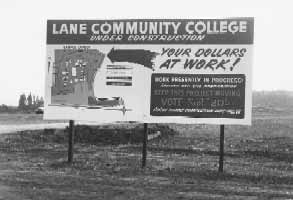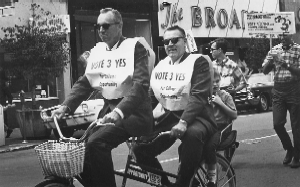The Parnell Precedent
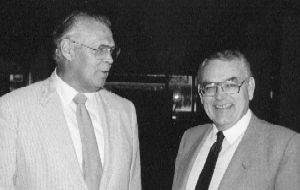
Eldon Schafer (left), president, 1970-1985,
Dale Parnell (right), president, 1965-1968
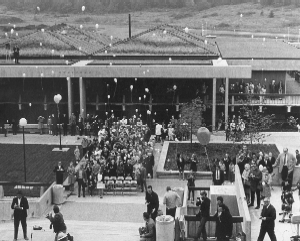
Dedication of 30th Avenue campus,
October 11, 1969
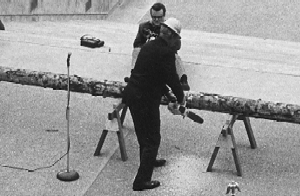
Governor Tom McCall used a chain saw
to cut a log, replacing the
traditional ribbon-cutting ceremony
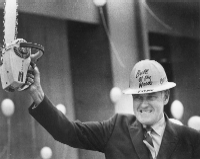
Governor Tom McCall with chain saw
|
Lane had experienced success after success in its early efforts. Things were going well as the end of the 1967-68 year approached. "We were really riding high with Parnell running the show, and the school was really moving," recalls board member Al Brauer. Community support was outstanding. Staff morale and commitment were never higher. The college was in excellent financial shape. A new campus was about ready for occupancy. Enrollment was growing. The college was achieving its mission.
Then, in Salem, on May 10, 1968, Governor Tom McCall announced that he was appointing Dale Parnell as Oregon Superintendent of Public Instruction, effective July 1. Parnell resigned from Lane in November 1968. The board named Robert E. Hamill, Lane's director of Institutional Research as acting president for 1968-69, and began a national search for their second president. Robert L. Pickering served as president, 1969-1970. Looking back, board members, staff and community leaders knew they'd had unusually effective leadership for three years and a month. Few realized that his influence would live on through the college's early decades, and probably a lot longer. Parnell empowered and energized people by inviting them to become partners in building an institution to which they could give unreserved commitment. The Parnell version of shared governance or participative decisionmaking was part accountability and part democracy. If he was rigid about getting the job done, he was equally flexible about giving people freedom to perform. He borrowed a slogan from a poster of the day, "To Do a Common Thing Uncommonly Well," and used it as a low-key rallying call.
Eldon G. Schafer was Lane's president, 1970-1985. Gerald Rasmussen, instructional administrator, says that Parnell and Schafer "are very much a part of the Western tradition of individualism and of opportunity. They're comfortabale in dealing with other poeple who are willing to express themselves and to disagree and debate. They're problem-oriented people and they deal with human beings at a very, very comfortable basis of equality."
The unparalleled productivity of the Parnell years would be remembered, but even that giant accomplishment would be seen as secondary to the establishment of participative governance. There was no retreat from the Parnell precedent. |


